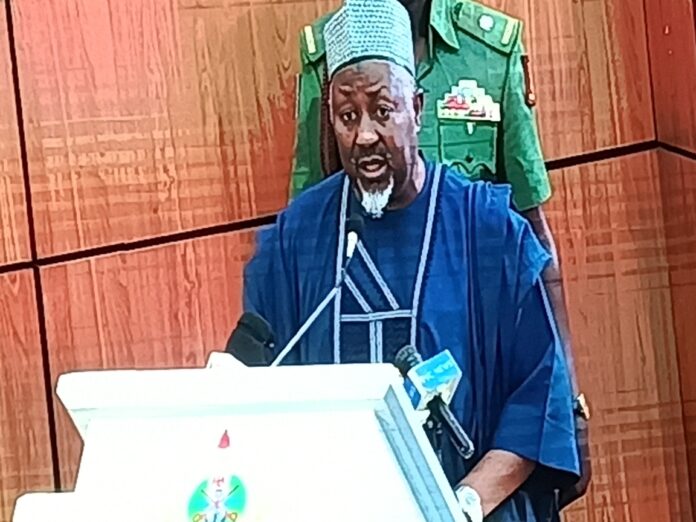The Minister of Defence, Alhaji Muhammed Badaru, has charged the graduating participants of the National Defence College (NDC)
By Sumaila Ogbaje
The Minister of Defence, Alhaji Muhammed Badaru, has charged the graduating participants of the National Defence College (NDC), to provide an enabling security environment for the development of the African continent.
Badaru gave th
e charge on Monday in Abuja at the Graduation Lecture for the Participants of NDC Course 32 titled, ”Democracy Beyond the Ballot Box: a Pathway to Africa’s Unity and Development”.
The lecture was delivered by a former President of Tanzania, Dr Jakaya Kikwete, as part of activities lined up for the graduation of the participants Aug. 23.
Badaru urged the graduating participants to leverage on the knowledge they have acquired.
He also charged them to individually and collectively seek ways of heralding solutions to advance the tenets of democracy as it related to facilitating Africa’s unity and development.
He said this was imperative as they have been duly equipped as strategic leaders and thinkers,
According to him, the lecture will offer a strategic approach to improve the democratic norms and economic positions of African states for the overall development of the continent.
”Of course, you know that development can only thrive where there is security.
”You must therefore ensure that you leverage the knowledge you have acquired in the past 11 months to provide an enabling security environment for the development that African continent is yearning for.
”I therefore urge you all, to enthusiastically listen and grab the speaker’s strategic insights on advancing democratic norms as a pathway to engendering Africa’s unity and development.”
The minister said that democracy in Africa catalysed unity and development through its emphasis on responsible civic engagement and public accountability.
According to him, effective democracies demand that leaders are held accountable for their actions, which can significantly promote the efficient use of resources.
He said that Nigeria in recent times had provided avenues for citizens to scrutinise and influence government action, thus resulting in a greater potential for policies that addressed the real needs of the population.
Badaru added that Nigeria’s democracy could thus influence regional dynamics whose positive engagement had been recorded through community dialogues and grassroots politics.
”The approach fosters an environment where national resources are used more effectively to improve infrastructure, education, and health care, thereby contributing to long-term development and stability.
”It sets a precedent for democratic practice that can ripple through the region, encouraging our West African nations to embrace similar approaches.
”This inclusivity not only strengthens Nigeria’s democracy, but also contributes to a more unified and resilient West African region and the continent at large,” he said.
The minister disclosed that the Economic Committee of West African States (ECOWAS) and African Union (AU), had instrumental roles to play in shaping democratic ethos that transcends national borders within the continent.
He said that the democratic values could help to unify Africa by promoting dialogue and cooperation among its diverse nations.
Earlier, the Commandant of NDC, Rear Adm. Olumuyiwa Olotu, said it was a tradition of the college to organise a graduation lecture as part of the graduation ceremony of each course.
Olotu said the lectures were organised to invite highly esteemed strategic leaders of repute to give lectures to the participants as a way of encouraging them to thrive for excellence in their leadership as they graduate from the college.
He said that Nigeria had in recent time, witnessed several security challenges and internal social contradictions related to politics, ethnicity, resource control, religion, and corruption which had continuously generated acrimony and heat up the polity.
According to him, the description of the scenario in Nigeria mirrors the happening in most other countries in Africa which are all pointers to the fact that democracy is yet to fully deliver its dividend to the citizens.
”The situation has impacted negatively on security and development in most African countries, hence, we need to take a look at how democracy should be practiced beyond the ballot box in order to engender unity and development in Africa.
”From the foregoing, we need to think out of the box and develop strategies that would enhance national unity and development in Nigeria as well as in other African countries and Africa in general.”(NAN)




